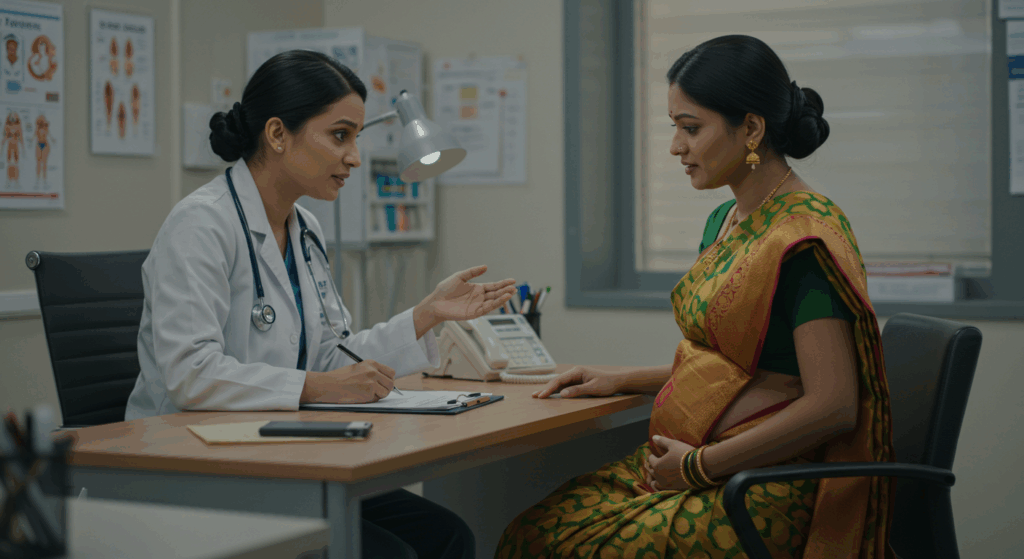Has that sudden burning feeling while peeing caught you off guard and left you worried and uncomfortable? Pain. Agitation. Stress. Three things every expecting mother wants to avoid-but this one symptom ticks all the boxes.
Frequent bathroom runs are normal in pregnancy, but when it burns, it might signal something more than just hormones. It could be a urinary tract infection or bladder irritation-things that need the right care and attention.
At Eva WomanCare clinic, we support expecting mothers through each stage-including moments like this. Our specialists combine expert diagnosis with compassionate care that understands what your body needs.
Common Causes of Burning Sensation in Urine During Pregnancy
Hormonal and physiological changes
During pregnancy, the body undergoes constant adjustments. Hormones like progesterone relax bladder muscles, causing slow urine flow. This makes it easier for bacteria to grow. Pressure from the expanding uterus also reduces the bladder’s space to empty fully, which might lead to irritation and that sharp burning feeling.
Development of urinary tract infections (UTIs)
Trapped urine becomes the perfect spot for bacteria. This is why UTIs are common, especially when bacteria enter the urinary system and multiply. In some cases, you may not feel it at first, but it can turn into a painful infection if untreated.
Irritation due to genital or vaginal changes
Increased discharge and genital sensitivity can irritate the vaginal area. Friction, hormonal fluid shifts, and pH changes might cause itching or a mild burning feel during peeing, even without infection.
Non-infectious urinary inflammation
Sometimes, the bladder reacts without bacteria being present. This can be because of sensitivity to hygiene products, dehydration, or temporary inflammation. The result feels very similar to an infection but with no underlying bacteria.

Recognising Symptoms and Urine-Related Changes
Symptomatic UTI signs to watch for
Need to pee often and urgently? If it burns or stings when you do, watch out. Pain when passing urine, along with cloudy or strange-smelling urine, can hint at an infection needing immediate attention.
Changes in urine appearance and smell
You might notice your urine looking darker than usual or giving off a stronger smell. These changes could be caused by hormonal shifts or might be one of the early pregnancy clues many women overlook.
Other discomforts indicating infection
If you feel a dull ache while emptying your bladder or a dragging sensation near your pelvis, these may accompany a growing UTI. Pain in the lower belly needs checking, especially during pregnancy.
Early pregnancy urine signs
Some women report subtle signs early on-like urine having a different odour or pattern. These alone aren’t proof of pregnancy but can be part of a bigger picture when combined with other symptoms.
Infection-Related Pain and Associated Risks
Risks of untreated infections
Ignoring urine pain can lead to kidney infections. That’s when things heat up with fever, chills, and even hospital stays. It could also affect the baby’s weight or cause early delivery.
Third-trimester bladder discomfort
As pregnancy progresses, the uterus presses harder on the bladder. This slows urine flow, raises infection chances, and causes sharp urethral pain. Repeated pressure may heighten discomfort.
Pain escalation hints serious concerns
If pain changes from annoying to unbearable or comes with cramps or spasms, it could suggest the infection is spreading. It’s important to get these checked before complications arise.
Possible impact on fetal well-being
Unchecked infections may indirectly affect the baby’s environment. Infections during late pregnancy can increase risk during delivery or contribute to foetal distress. Early diagnosis helps keep things safe.
Diagnosis and Differentiation from Pregnancy Symptoms
Distinguishing UTI vs normal pregnancy discomfort
Some symptoms blur lines-both pregnancy and UTIs bring tiredness, frequent urination, and pressure. But burning or persistent pain, especially during urination, points more towards infection.
Diagnostic tests and urine analysis
Your doctor may ask for a midstream urine sample. This simple test checks for infection indicators like white blood cells or bacterial presence. Results guide further treatment.
When to report symptoms to your doctor
Any new or worsening discomfort during urination shouldn’t be ignored. If the smell or colour of urine changes or you burn while peeing, report it during your next check-up.
Monitoring recurring or persistent infection
At Eva WomanCare Clinic, we keep a close watch during pregnancy check-ups. Recurring symptoms are flagged early, and we use screening to spot hidden infections early in the timeline.
Treatment Options and Home Remedies
Safe medications prescribed during pregnancy
Your doctor might select antibiotics classed safe in pregnancy. The dosage depends on the stage and your personal history. It’s key to complete your course even if you feel better.
Natural and home strategies
Plenty of water helps flush bacteria out. Cranberry supplements and natural vitamin C sources give mild support. Warm compresses offer some ease and can reduce bladder cramps.
Managing recurring infections
Good hygiene and frequent changing of undergarments go a long way. We usually counsel on daily hygiene, hydration habits, or addressing any contributing conditions causing recurrences.
Options during early pregnancy
Treating UTIs early keeps risks lower. In early months, care is taken with antibiotics. Keeping infections away here helps prevent complications later in pregnancy.
Prevention Tips and Everyday Care
Daily hygiene practices
We always advise from front to back wiping. Cleaning up before and after intercourse using gentle cleansers reduces bacterial travel to the urinary tract.
Clothing and toilet habits
Treating UTIs early keeps risks lower. In early months, care is taken with antibiotics. Keeping infections away here helps prevent complications later in pregnancy.
Fluid intake and lifestyle modifications
Drink enough water to keep your urine pale yellow. Set reminders if needed-hydration isn’t just comforting, it keeps bacteria away by flushing the tract regularly.
Emptying bladder fully
Leaning slightly forward while sitting on the toilet can help you drain the bladder better. Try not to “hold it in” too long during the day.
When to Seek Medical Help?
Late trimester warning signs
If urination pain worsens as your due date nears, pay attention. Spotting or contractions along with burning may mean more than just a UTI.
Pain paired with other symptoms
Fever, chills, or pain shooting towards your back indicate spreading infection. It’s better to address these signs early and avoid further complications.
Unrelieved discomfort after treatment
If prescribed antibiotics don’t help or burning returns quickly, you may need a new plan. The bacteria may have become resistant, and new tests may be needed.
Seeking timely consultation
Our regular antenatal visits at Eva WomanCare Clinic include urine checkups when needed. We use these to catch infections early and address them while keeping your pregnancy safe.
FAQs
How can I get rid of burning in urine during pregnancy?
Drink more water, avoid irritants, and visit your gynaecologist for a safe antibiotic if needed.
Is a burning sensation always a sign of UTI in pregnancy?
No, it can also be due to hormonal changes or irritation from vaginal discharge. But it’s good to check.
Can UTI hurt my baby during pregnancy?
Yes, untreated UTIs can cause early labour or low birth weight. Early care reduces these risks.
How to differentiate UTI and normal pregnancy symptoms?
UTI usually involves burning, urgency, and cloudy urine. Pregnancy alone does not cause those signs.
Which antibiotics are safe for UTIs in pregnancy?
Amoxicillin, cephalexin, and nitrofurantoin are considered safe but must be prescribed by your doctor.
Are there home remedies that actually help with UTI?
Yes, staying hydrated, using warm compresses, and cranberry extracts may provide support. These should not replace medication.
What are possible complications of holding urine often in pregnancy?
Frequent holding can cause bladder strain and increase UTI risk. Always use the washroom when you feel the need.
When Every Trip to the Bathroom Feels Like a Battle
Your instincts know something’s off, and you’re not imagining it-it’s uncomfortable, distracting and hard to ignore. What starts as a minor bother can quickly become an everyday struggle if left unaddressed.
The good news? It’s manageable with the right steps and trusted guidance. Simple changes, along with timely medical attention, can ease the discomfort and keep you and your little one safe.
At Eva WomanCare Clinic, we know this concern all too well and treat it with the gentleness it deserves. Book a consultation with us and let’s make your comfort a priority.

